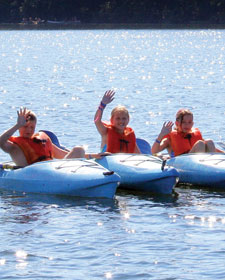
How to Prepare Your Child for Sleep Away Camp
When Jenny Wolkowitz’ youngest daughter went to  a two-week sleepover camp for the first time, the girl decided she didn’t need her favorite stuffed animal and left it at home. Days later, Wolkowitz had to put the toy in a box and send it to her homesick daughter by overnight delivery.
a two-week sleepover camp for the first time, the girl decided she didn’t need her favorite stuffed animal and left it at home. Days later, Wolkowitz had to put the toy in a box and send it to her homesick daughter by overnight delivery.
“I wished I had gone ahead and sent it with her from the beginning,” said Wolkowitz, who has made a career of matching kids and camps as the St. Louis representative for Tips on Trips and Camps, a free service that helps families find the perfect camp. “I should have stuffed it into the bottom of her pillowcase.”
While sleepover camp presents challenges for parents and children, it can ultimately be a very rewarding experience. Knowing what to expect will make a child’s first time easier on everyone.
Children will have fun at an overnight camp, but that’s just one reason for them to go. “The biggest benefit is the social aspect. They will make friends that will last a lifetime,” said Jon Evans, camp director at YMCA Camp Lakewood in Potosi, Mo. *(Please see editor's note below.)
Camp also:
• Requires children to talk to new people.
• Teaches the social lessons of cabin living.
• Teaches responsibility.
• Encourages physical exercise.
Finally, attending camp encourages independent thinking. Campers can decide what activities to participate in, without parent input. “It allows them to make individual choices,” said Wolkowitz, the St. Louis representative for Tips on Trips and Camps.
The ideal age for a first-time sleepover camp is between 8 and 12 years old. Safety takes precedence when looking at which camp to choose, but there are other considerations as well.
“Parents should ask questions about how the staff is hired,” said Evans. Ask about whether the camp does a local, state and federal background check on counselors, the average age of the counselors and the ratio of counselors to campers.
Parents should ask the camp director about safety precautions, especially when campers are around water. And Evans recommends asking if the camp is American Camp Association accredited.
Wolkowitz encourages parents to talk to their child about what camp he or she would like to attend, and she strongly recommends that parents research camps with their child.
Campers are less likely to become homesick if they’re kept busy, active and engaged. So when choosing a camp, it’s a good idea to look at the daily schedule. You want to find a camp that has plenty of fun, challenging activities planned daily.
A week-long camp is too short, Wolkowitz said. A camp lasting at least two weeks is better because it allows more time to get used to the routine and make friends.
Parents also need to decide whether they want their child to attend a co-ed camp or not. Campers may feel more relaxed at a same-sex camp, while a co-ed camp mirrors the everyday world and can help break gender stereotypes.
If you think your child is better off going with friends from home – think twice. “If there’s any chance of drama, especially with girls, don’t send them with friends from home,” said Frontenac parent Tracy Berg, who has sent her son and oldest daughter to camp and will send her youngest daughter to camp for the first time this year.
Going with friends also may discourage your child from making new friends and trying new activities – and from stepping out of his or her comfort zone. Berg said her oldest daughter, Madison, insists on going to camp without friends from home. She has made friends at the camp and spends time with them. Berg said that Madison is normally reserved, but she hears reports that at camp Madison is not as reserved. “We think she reinvents herself while she’s at camp,” Berg said.
Once parents and children decide on a camp, it’s a good idea for parents to talk to their child about the camp a few months ahead of time, to mentally prepare the child. Parents can start by sharing information about the camp with the child.
Most camps have information packets to read and DVDs to watch together. Plus parents can visit the camp website. If possible, take your child to visit the camp before it begins. “Take advantage of camp open houses,” Evans suggested. “See the facility. Let your child look around, explore. Let them see the dining hall and the cabins.”
To prepare children for a stay away from home, parents may want to send their child for overnight visits with family members. In addition, buying camp bedding, clothes and toiletries a couple of months before camp is a great way to get your child excited about going, Berg said.
Evans recommended that, if the camp offers a choice of activities, campers choose one activity that they enjoy, another that they’re good at, another that they want to learn more about, and another that they’ve never done before. “That way, they will participate in activities that they’re comfortable with and further those skills, and it will introduce them to new skills,” Evans said.
Berg told Madison that at camp she had to try an activity she couldn’t do at home. “She tried archery and rifling,” Berg said. “She liked rifling so much that she also did it the second year.”
Remind children that they have to be their own advocate, Berg said. “Say, ‘If you don’t like archery, you have to let the counselors know,’” Berg said. This helps children learn to assert themselves while helping ensure they have the best experience too.
“Something parents should know is that most children do experience homesickness,” said Mary Rogers, executive director of Sherwood Forest Camp in Lesterville, Mo., a camp primarily for low-income children but open to all campers.
A part of camp is dealing with homesickness and getting through it successfully. Camp experts agree parents absolutely should not tell their children they will pick them up if they become homesick. That can sabotage the experience, Rogers said. Wise parents instead advise their children that they’ll make it through, find friends and be happy once they get used to it.
Wolkowitz also advised parents not to talk to their children on the phone. When her youngest was homesick at camp, the camp workers asked her how she wanted to handle it. “I didn’t want to talk to her on the phone. I knew that the minute she hears my voice, she’s going to break down,” Wolkowitz said. Instead, she sent the stuffed toy to her daughter.
“She knew her homesickness had reached my ears,” Wolkowitz said. And, of course, it turned out fine. Her daughter made friends and decided to go again the following year. Berg’s daughter, Madison, went to her first sleepover camp – 400 miles away in Michigan – when she was 8.
“She was very nervous to go alone, but very excited at the same time,” Berg said. “I told her that the first day is the worst. When you wake up on the second morning, the worst will be over.”
Most camps don’t routinely let campers directly contact parents, but they do encourage parents to send letters or emails that will be printed for children to read. This can help reduce homesickness.
Keep the messages cheerful, Rogers advises.
“Never say, ‘We miss you so much.’ That can set off homesickness,” Rogers said. Most parents send stamps, paper and envelopes with their children too, so that campers can write home.
Many children like camp so much they miss it when they return home. “They can be campsick after they come home. That’s another end of the spectrum,” Wolkowitz said.
And hopefully, along with all the memories they make, first-time campers will remember to bring their stuffed animals back home
By Gina Parsons
This article appears in the Spring/Summer issue of St. Louis Kids Magazine
* Editor's Note: After interviews for this story were completed, YMCA Camp Lakewood welcomed Phil Beam as its new Camp Director. Phil joins Camp Lakewood after his tenures with YMCA camps in other regions of the United States. For more information about Camp Lakewood, call 1-888-FUN-YMCA or visit them online at www.camplakewood.org.
Photo courtesy of YMCA Trout Lodge/Camp Lakewood





















